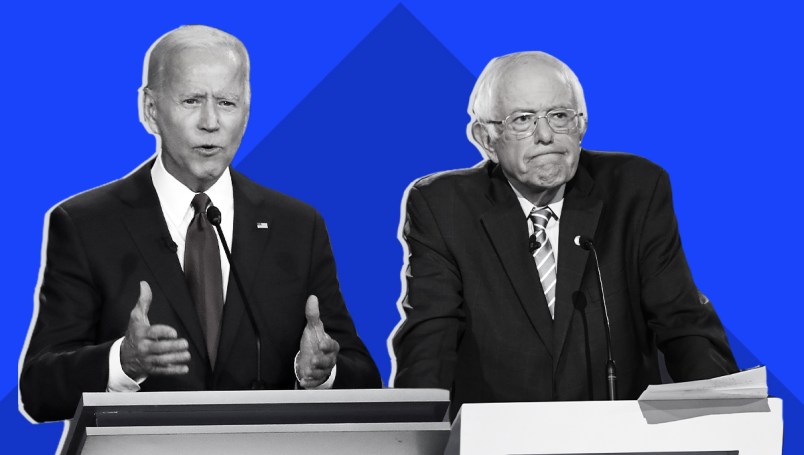Super Tuesday is here.
More than a third of the Democratic pledged delegates who will ultimately vote at the party’s convention this July will be assigned according to how voters choose their preferences today. Fourteen states will cast ballots, and American Samoa will hold its caucuses.
Going into Tuesday, Sen. Bernie Sanders (I-VT) and former Vice President Joe Biden are roughly split in their delegate counts, 60 to 54. Sen. Elizabeth Warren (D-MA) has 8. Former South Bend Mayor Pete Buttigieg and Sen. Amy Klobuchar (D-MN), both of whom dropped out after South Carolina, had 26 and 7 delegates, respectively.
That makes Tuesday’s competition largely one between the two leaders so far — Sanders and Biden — with Warren and former New York Mayor Michael Bloomberg potentially picking up handfuls of delegates in split states and congressional districts.
A total of 1,344 delegates will be awarded — 480 to candidates who reach 15% support in each of the respective states and 864 to candidates who reach that threshold in individual districts. (Another 13 delegates will be awarded in the “Democrats Abroad” primary, which takes place March 3–10.)
Biden should do well in the South, but he needs to deliver
Following his landslide win in South Carolina Saturday, Biden is poised to do well in many southern Super Tuesday states.
The possible exception is Texas, where Sanders has pulled ahead. But polls indicate Biden is strong in Virginia, North Carolina, Tennessee, Arkansas, and Oklahoma. (In states with less polling data — like Arkansas as well as Alabama — results are less certain.)
“To me, if Biden’s going to be nationally viable, he should be winning those states,” Kyle Kondik, managing editor of Sabato’s Crystal Ball, the newsletter from the University of Virginia’s Center for Politics, told TPM. “This is an important test for him.”
Of these states, North Carolina is the most significant, with its 110 delegate pot trailing just California and Texas for size on Super Tuesday. According to FiveThirtyEight’s polling average, Biden and Sanders are neck-and-neck in the state.
Texas, where Sanders has performed well in polls, will be worth watching: The Vermont senator has outpaced the former vice president by as many as 15 points in one recent poll, and by four or five points in others.
Meanwhile, keep in mind that South Carolina’s Biden voters outperformed what surveys predicted, a result that could show up in other southern states. “Actual results reflect reality better than polls do,” Kondik said.
Sanders looks good elsewhere, but expectations are high
Outside the South — most notably in California, with its 415 delegates — Sanders is poised to win big. Still, it doesn’t look likely, especially with Klobuchar and Buttigieg out of the way, that he will be the only candidate to surpass the 15% threshold in the Golden State.
“Bernie is likely to do extremely well in the interior Bay counties — Alameda, San Francisco, Santa Clara, San Mateo, maybe even Contra Costa — because this is the core of the progressive community in California,” Bruce Cain, a professor of political science at Stanford, told TPM. Other progressive “hotspots,” often around universities, could similarly turn out for Sanders.
“Where he may not do so well is when you get into the areas like the Inland Empire,” and rural communities, Cain said. “That’s where Biden-slash-Bloomberg may pick up.”
Sanders is also showing large polling margins in Colorado, Maine, Utah, and his home state of Vermont.
He also may outperform Warren in her home state of Massachusetts, and stands a chance at a plurality in Klobuchar’s home state of Minnesota — though that race is an open question now that Klobuchar has endorsed Biden.
With Warren and Bloomberg as strong runners-up, uncertainty remains
Though Sanders and Biden are well ahead of their competitors going into Super Tuesday, Warren and Bloomberg will significantly complicate the counting.
Bloomberg is the obvious factor, having spent $217 million on advertising in Super Tuesday states, dwarfing his competition. But without an electoral track record outside the Big Apple — and with Klobuchar and Buttigieg endorsing Biden — the former New York mayor has to justify his campaign.
“If he does not clear threshold in either California or Texas, I don’t see how he can make an argument to stay in,” said Joel Benenson, who worked for Barack Obama and Hillary Clinton and whose firm did polling this cycle for Pete Buttigieg.
Warren is another wildcard. Though she’s not projected to win outright anywhere, she’ll likely put up solid second- and third-place numbers across the country, and her campaign has said the Democratic National Convention is its “final play.”
“The most important thing to look at tomorrow is, is this a two-person race or a four-person race?” Benenson said.
Summer Concepcion contributed reporting.



